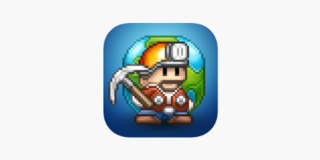
M.U.L.E. is a 1983 multiplayer video game written for the Atari 8-bit family of home computers by Ozark Softscape. Designer Danielle Bunten Berry took advantage of the four joystick ports of the Atari 400 and 800 to allow four-player simultaneous play. M.U.L.E. was one of the first five games published in 1983 by new company Electronic Arts, alongside Axis Assassin, Archon: The Light and the Dark, Worms?, and Hard Hat Mack. Primarily a turn-based strategy game, it incorporates real-time elements where players compete directly as well as aspects that simulate economics.

Edge is a puzzle-platform game developed by Mobigame for PC and iOS devices. The objective is to guide a rolling cube through maze-like levels and reach the goal. Originally released on the App Store in December 2008, it has been removed and re-added to the store multiple times due to a trademark dispute with Tim Langdell of Edge Games, concerning the use of the word "Edge" in the title. This had caused the game to be briefly released as Edge by Mobigame and Edgy, before ultimately returning to the App Store under its original name in January 2010. The game was released on multiple platforms including mobile phones, PlayStation Portable, Windows, Mac OS X, Linux, Android, Wii U, and Nintendo 3DS. It was released on Steam in August 2011 by publisher Two Tribes.

Temple Run is a 3D endless runner video game developed and published by Imangi Studios. The player controls an explorer who has obtained an ancient relic and runs from demonic monkey-like creatures chasing him. The game was initially released for iOS devices on August 4, 2011, and later ported to Android systems and Windows Phone 8.
Pastry Panic is a platform video game and the second release from American independent game developer Underground Pixel. The game was released in May 2012 for iOS. Since its release, the game has been generally well received by critics. The gameplay revolves around the player character eating as many sweets as possible to score points.

He-Man: The Most Powerful Game in the Universe is a 2012 handheld video game developed by Canadian studio Glitchsoft and released by Chillingo. Players control He-Man, travelling through seven regions of Eternia, with the possibility of summoning allies such as Man-At-Arms, the Sorceress and Orko in battle against Skeletor and the Evil Horde. Bosses include Skeletor himself, Beast Man, Trap Jaw, Mer-Man and Hordak.

Castle of Illusion Starring Mickey Mouse is a 2013 2.5D platform game developed by Sega Studios Australia and published by Sega. The game is a remake of the original 1990 Sega Genesis/Sega Mega Drive video game of the same name, which was the first title in the Illusion series of Mickey Mouse video games. The game was released on PlayStation 3, Windows, and Xbox 360, in September 2013, and later for iOS, Windows Phone, Android, and OS X.

Sonic Jump Fever was a 2014 vertical platform game developed by British studio Hardlight. It was the sequel to Sonic Jump. The game was made available for iOS and Android systems on July 10, 2014.

Lost Echo is a point-and-click adventure developed and published by KickBack Studios for iOS, Android and Windows Phone. It was released on September 27, 2013, for iOS. Later it was also released for Windows Phone and Android on June 18, 2014, and November 11, 2015, respectively. The game has gained a cult following. On February 9, 2019, and February 19, 2019, the developers updated the game with a complete remaster of the game for iOS and Android respectively. The developer, KickBack, is currently developing a sequel, entitled Lost Echo: Resonance.

The Great Jitters: Pudding Panic is an iOS action game developed by German studio kunst-stoff GmbH and released on June 7, 2011.

Monty Python's Cow Tossing is a catapult-physics game. It was developed by South African studio Luma Arcade and released by Zed Worldwide on February 3, 2011 for Android, iOS, and J2ME. The game is similar in style to Angry Birds and Crush the Castle, and includes the premise of firing cows at Englishmen who are located in structures built of concrete, wood, and other materials. It is based on the film Monty Python and the Holy Grail "in which French militiamen hurl a heifer onto a band of English relic seekers", and to further tie-in to the movie, "funny quotes from the movie appear in bubbles over the characters".

Wanderer: War Song is an iOS adventure game developed by Chinese studio WSITech and released on February 17, 2013.

Catch-22 was an iOS game developed by Dutch indie studio Mango Down and released on September 25, 2012.

Micro Miners is an iOS puzzle game developed by French studio BonusLevel.org and released on November 15, 2012.

World of Commodore is an annual computer expo dedicated to Commodore computers.

Jurassic Park Builder was a 2012 construction and management simulation video game developed and published by Ludia for iOS and Android operating systems, as well as Facebook. The game, based on the Jurassic Park series, allows the player to build a theme park featuring extinct animals. Ludia ended the game's support as of March 30, 2020.

Strikefleet Omega is a hybrid tower defense and real-time strategy video game for iOS, Android, and Fire OS. The player is put in control a small fleet of human ships, the titular Strikefleet Omega, in a series of battles against a race of aliens that have destroyed the Earth. The player must defend their large, immobile ships by dispatching groups of smaller space fighters to fend off alien ships approaching from all directions. In later stages of the game, additional types of fighter and additional weapons become available.

Junk Jack is an action-adventure sandbox video game by Italian developer Pixbits, originally released on iOS in 2011. A sequel entitled Junk Jack X was released on August 29, 2013. Junk Jack X has recently been renamed to Junk Jack, and the original game has been renamed to Junk Jack Retro.

Azkend 2: The World Beneath is a tile-matching video game developed by Finnish studio 10tons Ltd. It is a sequel to Azkend and was released on March 14, 2012 for Microsoft Windows and iOS, on June 7, 2012 for Android, on May 6, 2016 for PlayStation 4, PlayStation Vita, Xbox One, and on January 5, 2018 for Nintendo Switch.

Super Lemonade Factory is a puzzle-platform video game developed by Initials Command.
Pixel Gun 3D is a first-person shooter video game released in 2013 for iOS and Android. It was developed by American studio Lightmap and published by Cyprus studio Cubic Games, with both being acquired by Nexters in January 2022. According to Cubic Games, the game had surpassed 100 million downloads by that time. A Steam port has been announced and is to be released in 2024.
















